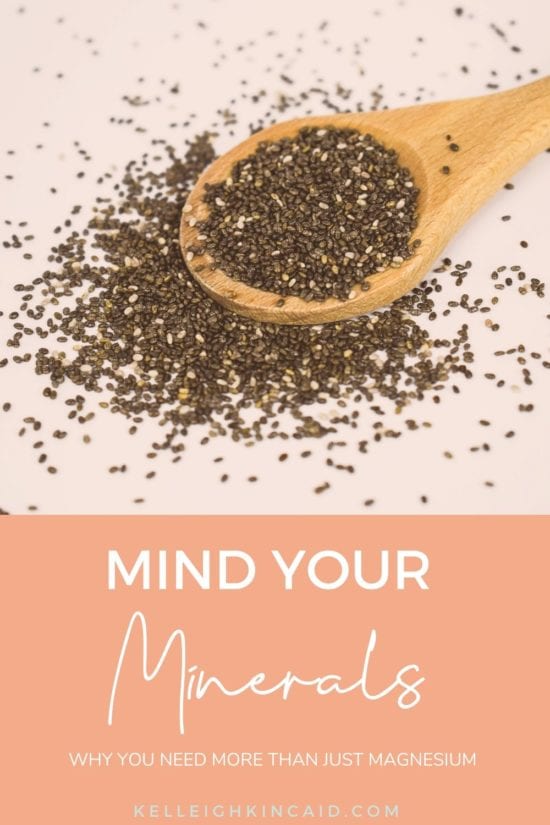Mind Your Minerals: Why You Need More Than Just Magnesium
Hey! You got up today, made breakfast, maybe went for a walk. Well, thank you minerals! These little badboys are like the spark plugs to your Lamborghini (yes, you totally drive a Lamborghini body around).

If you are mineral deficient, which SO many people are, you are not going to be able to keep your body functioning optimally. If you are deficient in these essential nutrients – because of soil depletion, chronic stress, a processed diet, or poor absorption (think gut/digestive issues) – you gotta start minding your minerals so you can look and feel your best.
You might feel fatigued, get sick a lot, not sleep well, have brain fog, and feel depressed if you are deficient. For example you need zinc to make stomach acid needed to break down proteins that become amino acids that make neurotransmitter to keep you happy! See what I mean? These are the raw materials our bodies need to run like a Lambo.
I am sure you have heard of the importance of magnesium, and it is a total rock star supporting more than 300 enzymatic processes in the body. But minerals go way beyond magnesium and they all work in concert with each other. Mega dosing on one can cause depletion in another.
WHY WE NEED MINERALS TO FEEL AWESOME
Minerals perform many actions in the body like:
• Act as cofactors for enzyme reactions
• Maintain pH balance
• Facilitate nutrient transfer across cell membranes
• Maintain proper nerve function
• Contract and relax muscles
• Regulate tissue growth
Minerals are like catalysts, or spark plugs for hundreds of actions in the body. Minerals also have staying power – they are the most long lasting part of a human and what remain after we die.

THE BIG 7 MINERALS WE NEED TO BALANCE
- Calcium – needed for bones, teeth, nervous system, cardiovascular system, muscle growth, acid-alkaline balance
- Phosphorous – bone growth, kidney function, cell growth, acid-alkaline balance
- Potassium – used in intercellular fluids, many chemical reactions in body
- Magnesium – teeth, nerve transmittion, over 300 enzymatic processes in body
- Sulfur – protects body from infection, slow down aging process, building block of cell membrane
- Sodium – water balance regulation, muscle contraction & expansion, acid-alkaline balance
- Chloride– needed for proper hydrochloric acid production (stomach acid to assist in digestion)
The best way to balance minerals is to eat real whole, properly prepared foods and drink mineralized water.

HOW TO GET MINERALS FROM FOOD
Overly processed foods (even gluten-free, vegan, organic, whatever) deplete minerals from the body.
Natures plan is that you get all your minerals from your food and water. However, there are some things that impede the absorption of minerals like phytic acid in grains and nuts, oxalic acid in leafy greens, and tannins, which bind with minerals and prevent them from being absorbed.
Phytic acid is found in nuts, seeds, and whole grains. If we soak these foods, we can neutralize the phytic acid and make the minerals more available (and that food easier to digest).
This is a traditional food preparation method. Traditional diets have so much wisdom there and this is just one example.
Oxalic acid – found in foods like spinach, Swiss chard, almonds, cocoa, and beets to name a few -also bind to minerals and can form oxalic crystals (and calcium deposits in the body, leading to kidney stones). Cooking can reduce the oxalates but as boiling is the best bet it is a catch-22. Boiling will also cause the minerals to leach out of the vegetable as well. So don’t over do it on the oxalate-rich foods, cook them well, but not too much.
“Minerals all work in synergy in the body. Mega dosing on one can lead to a deficiency in another. The key here is balance.”
Calcium
Calcium is the most abundant mineral in the body and is needed for strong bones and teeth, muscle (and heart) contraction, for transport of nutrients across cell membranes, neurotransmitter production, and for strong cardiovascular and nervous system function.
If we are eating a whole foods, properly prepared diet we are probably getting enough calcium but we need the proper co-factors to utilize it and absorb it. Calcium is found in leafy green vegetables, broccoli, kale, legumes, dairy, sardines, and lamb.
Calcium is a game of co-factors. So don’t go popping calcium supplements but instead focus on the cofactors needed. Too much calcium not going to the right places can cause calcium deposits in places you don’t want. Calcium is the most abundant mineral in the body and its highest priority is maintaining the homeostasis of the blood pH. One of the best things you can do for maintaining calcium in your bones is to make sure you are not creating an acidic environment in your body which will pull calcium from your bones to help alkalize your blood. Good digestion (starting with proper stomach acid) is foundational to absorbing and utilizing calcium from foods.
Co-factors for Calcium absorption are:
- Proper systemic pH – calcium is a buffer of blood pH and if the blood is too acidic it will pull calcium from the bones to alkalize the blood
- Proper stomach acid – requires hydrochloric acid for calcium uptake
- Balanced Hormone function – our Parathyroid, thyroid, adrenal, and sex hormones all help regulate calcium levels in the body.
- Hydration (water and electrolytes) – ensures calcium will be transported in and out of cells.
- Other minerals in balance – like Potassium, Manganese, Boron, Copper, and zinc
- Vitamin D – will increase level of calcium in blood
- Fatty acids – needed for transport of calcium across cell membrane
So you can see why we have a foundational approach to health. The body is a complex symphony and we must support all players for each to really shine. We must nourish the whole system and not just pop calcium because we think we are too low. The body doesn’t work like that.

Phosphorus
Phosphorus is the second most abundant mineral in the body (after calcium) and is mostly found in the bones and teeth. It also is an essential part of ATP (energy) production, is part of the phosopholipid bilayer that makes up all cells and part of DNA.
Most of us are getting too much phosphorus with the standard American diet and actually consume about twice what we need. Phosphorus is added to soda and carbonated beverages and as a preservative of many processed foods. This can inhibit calcium absorbtion. Phosphorus is found in many other foods too but must be in balace with magnesium and calcium.
It is also found in abundance is protein rich foods like meat, poultry, eggs, nuts, and beans.
Potassium
Potassium and sodium work in unison, known as the sodium-potassium pump. Potassium is abundant in the inner cellular fluids and sodium in the fluids outside the cell. These two minerals need to be balanced in the body. Potassium is also needed for proper heart and nerve conduction.
Rich in foods like avocado, sardines, bananas, dates, potatoes, and some beans and legumes.
Muscle cramps, weakness, fatigue and heart palpitations can be signs of deficiency but please do not take potassium supplements which can lead to potential toxicity. Instead, focus on getting it from whole food form.
Magnesium
Besides using electrolytes (which I will talk about later), magnesium is the one macro mineral I supplement with. It is estimated that 95% of Americans are deficient in magnesium and if there is one mineral you feel the difference with is magnesium.
It performs more than 300 enzymatic reactions in the body, but most notably helps you relax, keep your bowel movements regular, helps you sleep, helps you synthesize vitamin D, regulate blood sugar levels, and proper nerve function.
Craving chocolate, have PMS, migraines, or muscle cramps at night? You might need magnesium.
Sulfur
Sulfur can help the liver detox the body as it is essential for the production of glutathione, the master anti-oxidant in the body. Sulfur also necessary for collagen synthesis, insulin production, and the structure of important amino acids in the body. Sulfur can be found in foods like eggs, cruciferous vegetables, and animal products.
Sodium
Sodium regulates fluid balance in the body, sends nerve signals, and helps our muscles contract. The best way to get sodium in the diet is through unrefined sea salt or Himalayan rock salt. This type of salt contains various trace minerals that are important too. Avoid processed foods with added sodium, which is the crappy super refined iodized salt.
Chloride
Chloride works in harmony with sodium and potassium to regulate the passage of fluids across cell membranes and helps control the acid-alkaline balance in the body. It also helps maintain proper blood volume and pressure. The best source of chloride is in salt.

HOW TO GET MINERALS IN YOUR WATER
Adding electrolytes to water is super important for hydration but also a great source of getting macro minerals and trace minerals. I like to use Trace Minerals drops in my water which provides Magnesium, chloride, sodium, potassium, sulfate, lithium, boron, plus other ionic minerals in trace amounts. You can also add a pinch of sea salt and a squeeze of lemon to your water.
Speaking of trace minerals, we also need:
- Zinc
- Copper
- Chromium
- Boron
- Cobalt
- Selenium
- Germanium
- Iodine
- Iron
- Manganese
- Molybdenum
- Silicon
- Vanadium
Don’t worry too much about micro managing your micro minerals. Sure, there are some that you might want to check in with to make sure you are getting proper amounts. Zinc for example is crucial for making stomach acid, supporting the immune system, skin and bone health, and a cofactor of essential fatty acid metabolism.
Also chromium is important for regulating blood sugar levels (and is very hard to absorb from food). Iron deficiency is common, especially for menstruating women, but that might also be due to not absorbing it well from food.
So the key here is to eat real, fresh food, make sure we have good digestion (to absorb them) and also reduce the things like phytic acid and oxalates which bind to minerals.
If you really want to check your mineral status you can get a Hair Tissue Mineral Analysis which will not only tell you where your minerals are at but also give you the scoop on heavy metals that have accumulated in the body.
HOW TO BALANCE YOUR MINERALS
- Definitely use electrolytes – these remineralize your water, help keep you hydrated better but also keep your cells buzzing just right.
- Drink mineral rich bone broth. This has all the minerals in their usable form.
- Supplement with magnesium. Please don’t use magnesium carbonate (like the popular Calm magnesium supplement). Instead choose magnesium glycinate or magnesium bisglycinate.
- Eat calcium rich foods but don’t take calcium supplements. My favorite sources are leafy green vegetables, sardines with bone in (don’t be scared, they are actually delicious), chia seeds, sprouted almond butter, and grass-fed whey protein.
- Soak nuts and grains to remove phytic acid to absorb minerals better
- Make sure you have good stomach acid and that digestion is in tip-top shape so you can utilize all those good minerals you are eating in your whole foods, properly prepared diet.
